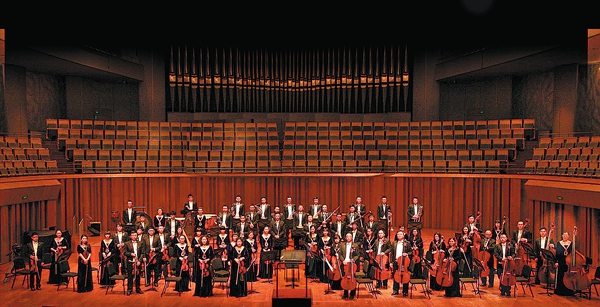

The composer, Liu, also from a Hakka family, named the first chapter of the composition Work Song, which portrays a scene of hardworking Hakka people with percussion and wind instruments. Boat on the Sea, the second chapter, featuring folk singer Zhang Dongmei, tells of the migration of the Hakka people. The third chapter, Night Words from the Earth Buildings, expresses the homesickness of the Hakka people after they resettle and build their new homes. Separating Heaven from Earth with a Huge Axe, the fourth chapter, is a celebration of Hakka culture and the final chapter, which is titled Song of Hakka, has a choir singing folks songs to the accompaniment of the orchestra.
"We did lots of research about the Hakka people. What impressed me most is that they preserve their culture and traditions very well," say Zheng. "For example, when we visited some Fujian tulou, the buildings are like pearls scattered across the mountainous areas. Found in various sizes, the buildings are well-preserved by the Hakka people through the generations."
Born and raised in Shanghai, Zheng began learning piano at 6, and enrolled to study composition at the Central Conservatory of Music in Beijing in 1952. In 1960, she pursued further studies in opera, symphony and conducting at the National Moscow Conservatory of Music.
On Oct 1, 1961, she conducted her first orchestral concert in Moscow, which she dedicated to the 12th anniversary of the founding of the People's Republic of China. The following year, she conducted Giacomo Puccini's opera, Tosca, in the Russian capital, becoming the first Chinese conductor to have performed in an international opera house.
During her decadeslong career, Zheng has not just been a co-founder of several Chinese symphony orchestras-including the Women's Philharmonic Chamber Orchestra, which, in 1989, was the first women's symphony orchestra in China-but is also a renowned music educator. Before retirement, she worked as the dean of the conducting department at the Central Conservatory of Music and was the principal conductor of the China National Opera House.
Since the 1980s, she has been devoted to popularizing classical music among Chinese audiences, especially college students, by offering public lectures on campuses and numerous public venues.
She notes that, around the world, female conductors are being recognized more than ever. On March 8, Zheng, along with 29 Chinese female conductors, including 88-year-old Yang Xiujuan, 76-year-old Wu Lingfen, 48-year-old Zhang Xian and 30-year-old Lai Jiajing, celebrated International Women's Day together by sharing their career stories on Chinese social media platforms.
"The chemistry between an orchestra and its conductor is very subtle. It's a very interesting subject, and you're never done learning," Zheng says. "I am grateful that I am still conducting at the age of 92. I am also happy to not just see, but to work with, the new generation of female conductors."